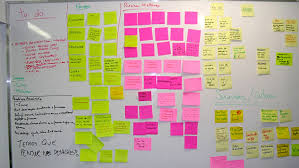Products that delight or exceed customer expectations are well positioned to succeed in the market place. Adherence to some “design thinking” principles below help Product Managers define and build successful products. With a good grasp of the customer problem, follow the steps outlined below.
1. Great products are built by Product Managers that truly empathize with their customers. In order to do this, get into their skin, walk in their shoes to experience their pain/problem. You can either shadow them or actually do their job. Interview potential customers regarding their tasks – ask them the “why, what, when, how”. Question the complexity or time needed to complete a task.
2. Capture all your learning. Take pictures or videos. Process all the learning. Separate facts from opinions. Get clarification if required. Build “customer journey maps” that tell their story. Capture emotions during the journey map. It will guide you to the focus areas and “key moments of truth”.
3. Ensure that you have a clear definition of the problem you are going after in the customer journey map. Capture the outcomes and align on how success will be measured. Be aware of assumptions, get clarification if needed.
4. Creatively brainstorm ideas to solve the problem. Dream big. Use some brainstorming techniques like “Affinity Diagrams” with post it notes. Unleash the team’s imagination. Be patient and inclusive to diverse ideas.
5. Quickly build a prototype. Use simple tools. Speed and learning is more important than getting it right the first time. At this stage debate, experiment, fail, and learn. Sharpen ideas with feedback, reflection, and adjustment. It saves time and money in the long run.
6. Test the prototype with customers. Get a diverse sample of potential customers to collect a holistic set of opinions. Observe the customer using the product without participating and influencing reactions. Ask open ended questions.
7. Debrief together to share customer responses. Iterate changes in the prototype based on the comments. Take it out for another test drive with a different set of customers.
8. Once you feel satisfied that you have customer validation build the MVP (minimum viable product). Again, don’t wait for perfection. “Go with your gut”. Document all assumptions.
9. Take the MVP for a trial run with beta customers. Perceive customer reactions and learn from them.
10. Launch the product, gather and synthesize reactions, and improve. Repeat the process with another customer problem.
For more information on Design Thinking : http://dschool.stanford.edu/

